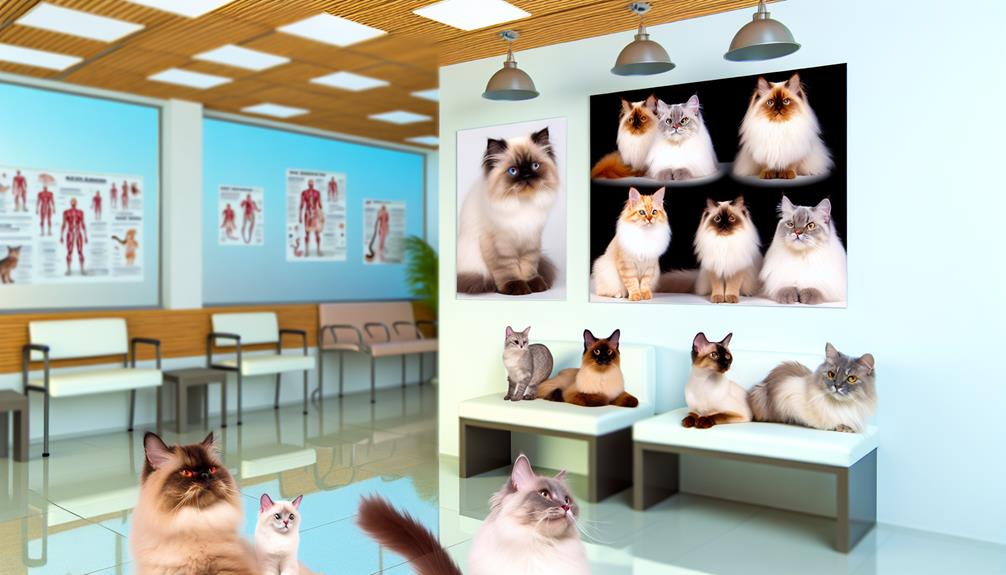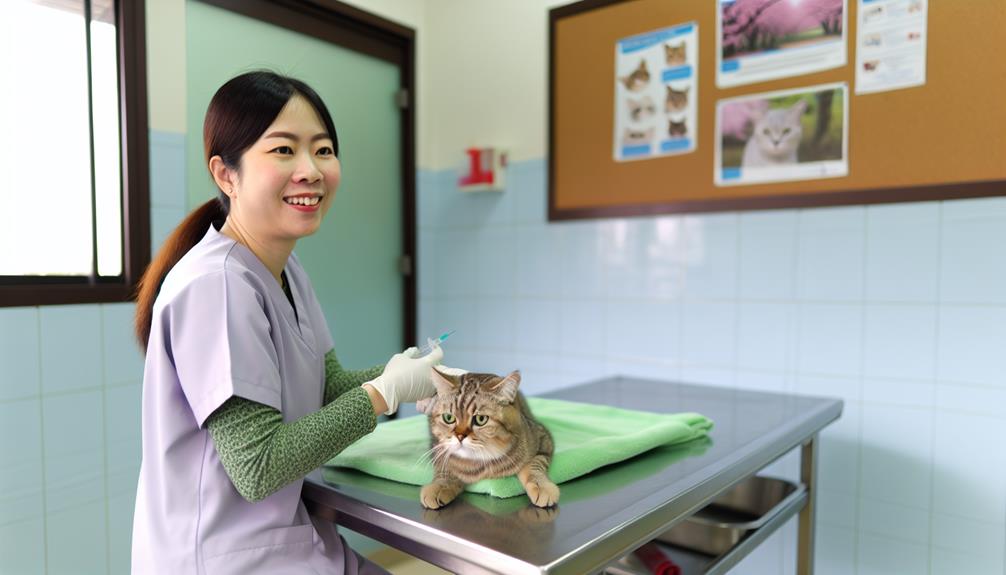Did you know that vaccinations are super important for keeping our furry friends healthy? They do so much to protect our cats from deadly diseases, boost their immune systems, and keep them safe from contagious infections. But have you ever wondered why these vaccinations are so crucial? Well, today we're gonna dive into the benefits of vaccinations, the risks of not getting them, and how they help not just individual cats, but the whole cat community. So get ready to discover all the reasons why vaccinations are a must for our cat's health!
Key Takeaways
Key Takeaways:
- Vaccinations are extremely important for keeping cats healthy and happy.
- They protect cats from dangerous diseases and prevent infections from spreading.
- Vaccinations also boost a cat's immune system, making them stronger and more resistant to sickness.
- Getting your cat vaccinated not only helps them, but also helps protect the entire kitty community.
- As responsible pet owners, it is our duty to make sure our fur babies get their shots.
Preventing Deadly Diseases
How can we keep our furry friends safe and healthy? The answer is simple: vaccinations! Vaccinations are like a superhero shield that protects cats from dangerous diseases. They boost the cat's immune system and help fight off infections. Here's why vaccinations are so important:
- Preventing Deadly Diseases: Vaccinations protect cats from infectious diseases that can be deadly. By getting vaccinated, we can keep our cats safe and healthy.
- Building Immunity: Vaccines stimulate the cat's immune system to produce special fighters called antibodies. These antibodies can battle against specific diseases, preventing them from taking hold in the cat's body.
- Lessening the Severity: Even if a vaccinated cat does get infected, the disease will be milder because the immune system is prepared to fight it off. Vaccinations reduce the severity of the disease and help cats recover faster.
- Protecting Others: Vaccinated cats not only protect themselves but also prevent the spread of diseases to other cats and animals. By getting vaccinated, we contribute to the overall health of the cat community.
So, what vaccines should cats get? There are core vaccines that protect against highly contagious and life-threatening diseases like rabies, feline panleukopenia, feline herpesvirus, and feline calicivirus. Depending on a cat's lifestyle and exposure risks, non-core vaccines may also be recommended.
Building a Strong Immune System
How can you help your cat stay healthy and strong? Well, just like humans, cats have an immune system that fights off germs and keeps them healthy. But sometimes their immune system needs a little boost. So, let's learn some ways to build a strong immune system for your furry friend!
- Good Food for a Strong Cat: What your cat eats plays a big role in their immune health. Give them a balanced and nutritious diet with high-quality protein, vitamins, and minerals. This will give their immune system the fuel it needs to stay strong.
- Playtime for a Healthy Cat: Did you know that exercise is good for your cat's immune system? Yep, that's right! Regular playtime helps improve their blood circulation and lymphatic flow, which are important for a strong immune system. So, make sure to give your cat plenty of opportunities to run, jump, and play.
- Keeping Clean for a Happy Cat: Good hygiene is important for your cat's immune health. Regular grooming helps keep their skin and coat healthy, preventing infections and parasites. And don't forget about their teeth! Brushing their teeth and giving them dental treats can help prevent dental diseases that can weaken their immune system.
Protecting Against Contagious Infections
How Vaccines Protect Your Cat's Health
Did you know that vaccines are like superheroes for your cat's immune system? They help protect against contagious infections and keep your furry friend healthy and happy. Let's dive into how vaccines work and why they are so important.
- What are vaccines?
- Vaccines are like training sessions for your cat's immune system. They teach it how to fight off specific diseases.
- They contain a tiny, harmless part of the disease-causing germ called an antigen.
- When the vaccine is given, the immune system recognizes the antigen and learns how to make special proteins called antibodies to fight the infection.
- How do vaccines protect your cat?
- Vaccines help prepare your cat's immune system to recognize and fight off the real disease if they ever get exposed to it.
- They reduce the severity of the disease and lower the chances of complications if your cat does become infected.
- Vaccines are like a shield that strengthens your cat's defenses against harmful infections.
- Are vaccines 100% effective?
- While vaccines are highly effective, they may not provide complete protection against all diseases.
- However, they significantly decrease the severity of the disease and the chances of your cat getting sick.
- Following the recommended vaccine schedule given by your veterinarian is crucial for long-term protection.
- What is herd immunity?
- Herd immunity is like having a superhero team that protects everyone, even those who can't get vaccinated.
- When a large percentage of the cat population is vaccinated, it becomes difficult for diseases to spread.
- Herd immunity helps protect vulnerable kittens and cats with weakened immune systems.
- Why should you vaccinate your cat?
- Vaccinating your cat not only keeps them healthy but also contributes to the overall well-being of the cat population.
- It helps prevent the spread of contagious diseases and creates a safer environment for all cats.
- By vaccinating your cat, you're being a superhero in protecting their health and the health of others.
Ensuring Long-term Health and Well-being
How can you make sure your cat stays healthy and happy for a long time? Well, it's not just about taking them to the vet for shots. There are a few things you can do to keep your furry friend in tip-top shape and save on vet bills too. Let's dive in!
- Feed your cat the right stuff:
- Cats have special dietary needs, so it's important to give them food that meets those needs.
- Talk to your vet to figure out the best diet for your cat based on their age, weight, and any health issues they might have.
- A balanced and nutritious diet will keep your cat healthy and help prevent future health problems.
- Get them moving:
- Regular exercise is key to keeping your cat fit and strong.
- Play with your cat and give them toys that encourage physical activity.
- This will help prevent them from becoming overweight and keep their muscles in shape.
- Plus, it's a lot of fun for both of you!
- Take care of their teeth:
- Dental problems can be a big issue for cats and can lead to pain and other health problems.
- Make sure to brush your cat's teeth regularly to keep them clean.
- You can also give them dental treats or toys to help keep their teeth in good shape.
- And don't forget to schedule regular dental cleanings with your vet.
- Don't skip the check-ups:
- Regular visits to the vet are super important for your cat's health.
- Your vet can keep an eye on your cat's overall health and catch any issues early on.
- This can help prevent more serious conditions and save you money on expensive treatments later.
Safeguarding the Cat Community
Safeguarding the Cat Community: How Can We Keep Our Feline Friends Healthy and Safe?
Hey there, cat lovers! Did you know that there are ways we can protect our furry friends and keep them healthy? Let's talk about some important things we can do to safeguard the cat community.
- Community Outreach: Spreading the Word
- Have you ever heard of community outreach? It's when we reach out to cat owners and teach them important things about taking care of their pets. Here's how it can help:
- Workshops and seminars: These are like fun classes where cat owners can learn about vaccinations and responsible pet ownership.
- Informational campaigns: We can raise awareness through posters, social media, and other ways to let people know how important vaccinations are.
- Why are vaccinations important? They help prevent contagious diseases from spreading among cats in our community.
- Responsible Pet Ownership: Taking Care of Our Cats
- Being a responsible pet owner means doing everything we can to keep our cats healthy and safe. Here's what it involves:
- Timely vaccinations and veterinary care: We should take our cats to the vet regularly and make sure they get the right vaccinations at the right time.
- Regular check-ups: Just like we go to the doctor for check-ups, our cats need them too. It helps catch any health problems early.
- Keep cats indoors: Did you know that keeping our cats indoors can protect them from catching diseases and getting into fights with other cats?
By following these simple steps, we can make sure our furry friends stay healthy and happy. Let's work together to safeguard the cat community!
Keywords: safeguarding the cat community, cat owners, vaccinations, responsible pet ownership, community outreach, workshops, seminars, informational campaigns, contagious diseases, veterinary care, regular check-ups, keeping cats indoors.
Frequently Asked Questions
How Often Should My Cat Be Vaccinated?
Frequently Asked Questions:
Q: Why do cats need vaccinations?
A: Cats need vaccinations to protect them from diseases that can make them very sick. Just like how we get shots to stay healthy, cats need shots too!
Q: How often should my cat be vaccinated?
A: Your cat should get vaccinations according to a schedule recommended by a veterinarian. This schedule might depend on how old your cat is, what kind of lifestyle they have, and where you live. Your vet will know the best timing for your cat's shots.
Q: What diseases do cat vaccinations protect against?
A: Cat vaccinations protect against diseases like rabies, feline distemper, and feline leukemia. These diseases can be really dangerous for cats, so it's important to keep them protected.
Q: What happens if my cat doesn't get vaccinated?
A: If your cat doesn't get vaccinated, they can get sick from diseases that could have been prevented. These diseases can make them feel really bad and sometimes even cause death. Vaccinations help keep cats healthy and safe.
Q: Do cats need booster shots?
A: Yes, cats need booster shots to keep their immunity strong. Booster shots are like a reminder to the immune system to keep fighting off diseases. They help make sure your cat stays protected and healthy.
Q: Are cat vaccinations safe?
A: Yes, cat vaccinations are safe! Veterinarians have done a lot of research to make sure the vaccines are safe for cats. Sometimes, cats might have a little soreness or feel a bit tired after getting a shot, but that is normal and it goes away quickly.
Q: Can indoor cats skip vaccinations?
A: Even though indoor cats might not go outside as much, they can still get sick from diseases. It's important to still get them vaccinated to keep them protected. Remember, it's better to be safe than sorry!
Q: Can I vaccinate my cat myself?
A: It's not a good idea to vaccinate your cat yourself. Veterinarians have the knowledge and experience to give the shots correctly and also to make sure your cat gets the right vaccines for their needs. Let the experts take care of it!
Q: How much do cat vaccinations cost?
A: The cost of cat vaccinations can vary depending on where you live and what vaccines your cat needs. It's best to ask your veterinarian about the cost. Remember, keeping your cat healthy is an important investment!
Q: Can my cat get sick from the vaccines?
A: It's very unlikely for cats to get sick from vaccines. The vaccines are designed to help the immune system fight off diseases, not make cats sick. Your vet will keep an eye on your cat after getting vaccinated just to make sure everything is okay.
Can Vaccines Cause Any Side Effects in Cats?
Frequently Asked Questions about Vaccine Side Effects in Cats:
Q: Can vaccines make cats sick?
A: Sometimes, vaccines can cause mild side effects in cats, like a little fever or feeling tired. But these side effects usually go away quickly, and they're not as bad as getting sick from the actual diseases vaccines protect against.
Q: Are vaccines safe for cats?
A: Yes, vaccines are generally safe for cats. They go through a lot of testing before they're given to cats to make sure they won't cause any serious harm. The benefits of vaccines, like protecting against dangerous diseases, outweigh the small risk of side effects.
Q: How long do vaccine side effects last in cats?
A: Most vaccine side effects in cats are temporary and go away on their own within a day or two. If your cat has any side effects that last longer or seem serious, it's a good idea to talk to your veterinarian just to make sure everything is okay.
Q: What are the most common side effects of cat vaccines?
A: The most common side effects of cat vaccines are usually mild, like a little fever or being a bit tired. Sometimes cats might have a small lump where they got the vaccine, but that usually goes away too. These side effects are nothing to worry too much about.
Q: Can vaccines cause allergies in cats?
A: It's very rare for vaccines to cause allergies in cats. The ingredients in vaccines are carefully chosen to be safe for cats, and lots of cats get vaccines without any problems. If your cat has ever had an allergic reaction to a vaccine, let your veterinarian know so they can find a different option.
Q: Should I be worried about vaccine side effects in my cat?
A: You don't need to be too worried about vaccine side effects in your cat. Like I said, they're usually mild and go away quickly. It's much more dangerous for your cat to catch the diseases that vaccines protect against. So, it's better to get the vaccines and keep your cat healthy.
Q: What should I do if my cat has a bad reaction to a vaccine?
A: If your cat ever has a bad reaction to a vaccine, like trouble breathing or a really bad fever, you should call your veterinarian right away. They can give you advice on what to do and make sure your cat gets the help they need.
Are There Any Alternative Options to Vaccinations for Cat Health?
Q: Are there any alternatives to vaccinations for cat health?
A: Yes, there are alternative options like alternative therapies and natural remedies. These can help support a cat's overall health, but they may not provide the same level of protection against infectious diseases as vaccinations do. It's important to talk to a veterinarian to understand the best approach for your cat's individual needs.
What Should I Do if My Cat Misses a Scheduled Vaccination?
Frequently Asked Questions:
Q: What should I do if my cat misses a scheduled vaccination?
A: If your cat misses a vaccination, it's important to tell your vet right away. Vaccinations protect your cat from getting sick, so it's best not to delay them. Your vet can help you figure out what to do next, like suggesting other options or creating a new vaccination schedule.
Q: Why are vaccinations important for cats?
A: Vaccinations are like a shield that protects your cat from getting sick. They help prevent dangerous diseases that can make your cat really sick or even cause death. So, it's super important to get your cat vaccinated to keep them healthy and happy.
Q: Can my cat get sick if they miss a vaccination?
A: Yes, if your cat misses a vaccination, they could get sick. Vaccinations work by training your cat's immune system to fight off harmful germs. Without them, your cat's immune system might not be ready to handle those germs, leaving them vulnerable to sickness.
Q: What happens if I don't vaccinate my cat at all?
A: If you don't vaccinate your cat at all, they could be at risk of catching serious diseases. These diseases can be really dangerous and make your cat very sick. By not vaccinating, you're putting your cat's health in danger.
Q: Can my cat's vaccinations be done later if they were missed?
A: Yes, if your cat missed a vaccination, it can usually be done later. Your vet will help you make a new schedule to catch up on the missed shots. It's important to follow their advice and get your cat back on track with their vaccinations.
Q: Are there any alternatives to vaccinations for my cat?
A: Vaccinations are the best way to protect your cat, but in some cases, there may be alternatives. Your vet can help you understand if there are any other options available for your specific cat. It's always a good idea to talk to your vet before making any decisions.
Q: How often do cats need to be vaccinated?
A: Cats need to be vaccinated regularly to stay protected. When your cat is a kitten, they'll need a series of shots. After that, they'll need booster shots every 1-3 years, depending on the vaccine. Your vet will create a vaccination schedule that's right for your cat.
Are There Any Specific Vaccines Recommended for Outdoor Cats Vs Indoor Cats?
Frequently Asked Questions (FAQs):
Q: Do outdoor cats need different vaccines than indoor cats?
A: Yes, outdoor cats and indoor cats may have different vaccination needs. Outdoor cats have a higher risk of coming into contact with diseases like feline leukemia virus (FeLV) and feline immunodeficiency virus (FIV). These vaccines are recommended specifically for outdoor cats. Indoor cats, on the other hand, may need core vaccines like those for rabies and diseases like feline viral rhinotracheitis, calicivirus, and panleukopenia (FVRCP). It's important to consult with a veterinarian to determine the right vaccines based on your cat's lifestyle and risk factors.
Q: What is the difference between FeLV and FIV?
A: FeLV (feline leukemia virus) and FIV (feline immunodeficiency virus) are two different diseases that can affect cats. FeLV can weaken the immune system and cause various health problems, while FIV weakens the immune system over time, making cats more susceptible to infections. Both diseases can be transmitted through bites, mutual grooming, and sharing food/water bowls. Vaccines are available to help protect outdoor cats from these diseases.
Q: Why do indoor cats need vaccines if they don't go outside?
A: Even though indoor cats don't go outside, they can still be at risk of diseases. Rabies is a serious disease that can be transmitted by wild animals that may enter your home. The core vaccines like FVRCP protect indoor cats against common infectious diseases that can be transmitted through contact with other cats or contaminated objects. Vaccinating indoor cats helps ensure they stay healthy and protected.
Q: Can outdoor cats get rabies?
A: Yes, outdoor cats can be at risk of getting rabies if they come into contact with infected animals like raccoons, bats, or skunks. Rabies is a deadly disease that affects the nervous system and can be transmitted through bites. That's why it's important for outdoor cats to receive the rabies vaccine to protect them from this dangerous disease.
Q: How often do cats need to be vaccinated?
A: The frequency of vaccinations for cats can vary depending on the specific vaccines and the cat's lifestyle. Some vaccines, like rabies, need to be given annually, while others may be given every three years. Your veterinarian will create a personalized vaccination schedule for your cat based on their needs and risk factors. It's important to follow this schedule to ensure your cat stays protected against diseases.
Conclusion
To sum it up, vaccinations are super important for keeping cats healthy and happy. They prevent dangerous diseases, boost their immune system, and stop infections from spreading. Vaccinations don't just protect one cat, but the whole kitty community. So, as responsible pet owners, let's make sure our fur babies get their shots! If you want to learn more or share your thoughts, join the conversation or read up on vaccinations for cats. Stay curious, cat lovers!




